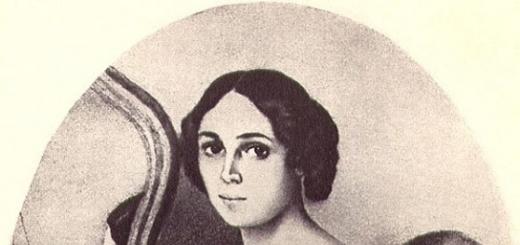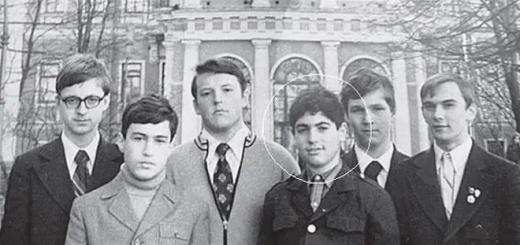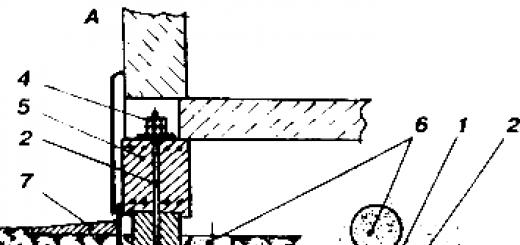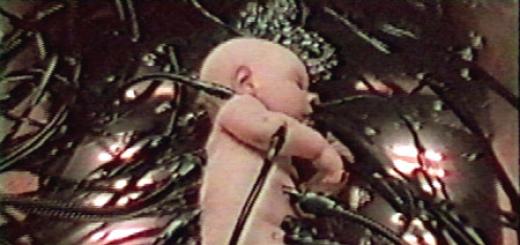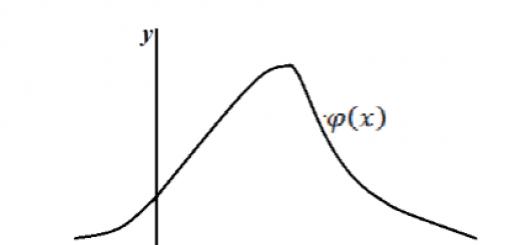Dmitry Merezhkovsky (1866−1941)
If Valery Bryusov promoted symbolism “to the masses” in Moscow, then Merezhkovsky stood at the origins of this movement in St. Petersburg. He was the husband of the poetess Zinaida Gippius. He was nominated ten times for the Nobel Prize in Literature. He is remembered for his radical political views and unusual religious and philosophical approach to poetry.
“One of the deepest features of the Russian spirit is that it is very difficult to move us, but once we have moved, we go to the extreme in everything, in good and evil, in truth and lies, in wisdom and madness.”
Fyodor Sologub (1863−1927)

The poet's real name is Fedor Teternikov. He became famous thanks to the publication of poems and stories in the literary magazine Severny Vestnik. Sologub did not have a good relationship with the new Soviet government after the 1917 revolution, which is why he tried to move abroad. But his departure was disrupted, and the writer often had to write “on the table” - no one would publish it.
“They killed my Russia,
Buried in a dumb grave!
I will hide my sadness deeply,
I will shut up in front of the angry crowd.
Sleep in your grave, my Russia,
Until the desired and bright spring!
A stream of your lightning will splash,
And spring dreams will flow.”
Konstantin Balmont (1867−1942)

One of the most fruitful symbolists and writers of the Silver Age of Russian literature. He has written dozens of collections of poetry and prose. He translated Shakespeare, Wilde, Poe, as well as works from Japanese, Mexican, Bulgarian, Lithuanian, and Georgian literature. Until his old age, he considered himself a revolutionary, dreaming “of the embodiment of human happiness on earth.”
“Language, our magnificent language.
River and steppe expanse in it,
It contains the screams of an eagle and the roar of a wolf,
The chanting and ringing and incense of pilgrimage.
It contains the cooing of a dove in the spring,
The lark takes off towards the sun - higher, higher.
Birch Grove. The light is through.
Heavenly rain spilled on the roof.”
Alexander Blok (1880−1921)

Alexander Blok was from the ranks of the so-called “younger symbolists” or young symbolists. They differed from the “elders” in that their poetry was based on the idealistic concept of Vladimir Solovyov. The Young Symbolists looked at poetry from a philosophical point of view. Such was Blok, who already at the age of five scribbled his first poems. He married the daughter of the famous chemist Mendeleev - Lyubov Mendeleeva.
“The artist’s direct responsibility is to show, not prove.”
Andrey Bely (1880−1934)

Also, like Alexander Blok, he was one of the Young Symbolists. Around his person a literary circle “Argonauts” was formed, which included young poets. He worked closely with the monthly magazine “Libra”, which was published by the publishing house of Russian symbolists “Scorpio”. Osip Mandelstam called Bely “the pinnacle of Russian psychological prose.”
“St. Petersburg streets have an undoubted property: they turn passers-by into shadows; the shadows of St. Petersburg streets turn into people"
Zinaida Gippius (1869−1945)

Her marriage to Merezhkovsky was one of the most original creative unions in the history of literature. Despite the fact that they were engaged, Gippius was a rival for her husband. Therefore, she agreed with Merezhkovsky that she would write only prose, and he would write poetry. True, their agreement was very soon violated. She had a special interest in men's clothing and can therefore often be seen in photographs wearing men's clothing.
“I don’t want, I don’t want anything,
I accept everything as it comes.
I don't want to change anything.
I breathe, I live, I am silent.
I accept what will happen
I accept illness and death.
May everything that needs to happen come true!
I don’t want to break or create.”
Zinaida Gippius. Photo. Saint Petersburg. 1910s
“I don’t know your Moscow customs. Is it possible to wear white dresses everywhere? I can't do it any other way. Somehow my skin can’t stand a different color.” Had she not written a single line, had not “burned with a verb” a single heart, her image would still have remained in the history of Russian culture of the twentieth century - in that very white airy dress and in a tiara with a huge diamond on her luxurious golden-red hair...
Zinaida Gippius was born on November 8, 1869 in the city of Belyov, Tula province. Father Nikolai Romanovich Gippius after  After graduating from the Faculty of Law, he was in the public service and the whole family, in which, in addition to Zina, there were three more little sisters, a grandmother and an unmarried sister of the mother, was constantly on the move - Tula, Saratov, Kharkov, St. Petersburg, Nizhyn, Chernigov region.
After graduating from the Faculty of Law, he was in the public service and the whole family, in which, in addition to Zina, there were three more little sisters, a grandmother and an unmarried sister of the mother, was constantly on the move - Tula, Saratov, Kharkov, St. Petersburg, Nizhyn, Chernigov region.
His father's business moves made systematic education impossible. Zina began studying at the Kiev Institute of Noble Maidens, but due to frequent illnesses, caused, as the mentors considered, by excessive longing for her family, her parents were forced to take her home.
In March 1881, Nikolai Romanovich died of tuberculosis. And when, to the horror of her mother, who was afraid of heredity, tuberculosis was discovered in Zina, it was decided that the family would move to Crimea. By that time, Gippius had already completely switched to home schooling, read a lot, kept diaries and wrote funny poetic parodies of family and friends.
“Books - and endless personal, almost always secret writings - only this alone mainly occupied me.”
After Crimea, the family moved to the Caucasus. It was there, in Tiflis - in a whirlwind of fun, dancing, poetry competitions and horse races - that the fateful meeting of Zinaida Gippius and Dmitry Merezhkovsky, a young but already quite famous poet, took place. She once read his poems published in the St. Petersburg magazine “Picturesque Review”. She even remembered the name, but the rhymes themselves did not make much of an impression on her then.


“We met and both of us suddenly began to talk as if it had long been decided that we were getting married, and that it would be good.”
A year later, on January 8, 1889, Gippius and Merezhkovsky got married in the Tiflis Church of the Archangel Michael. The bride was in a dark tailored suit and a small hat with a pink lining, the groom was in a frock coat and uniform overcoat. She was 19, he was 23. They lived together for 52 years, never being separated for a single day.


Immediately after the wedding, Gippius and Merezhkovsky moved to St. Petersburg and settled in a small rented apartment: each had a separate bedroom, their own office and a common living room, where they received guests - poets, writers, artists, religious and political figures. Gippius became the queen of this brilliant literary salon. Not a mistress, but a queen. The fragile, capricious girl, who at first was perceived only as a shadow of her famous husband, managed to break all possible stereotypes and win among her contemporaries the title of “decadent Madonna” - an inspiration and one of the most merciless critics of her era.

Gippius, Philosophers, Merezhkovsky

“They said about Gippius - evil, proud, smart, self-important. Apart from “smart,” everything is wrong, that is, she may be evil, but not to the extent, not in the style that is commonly thought of. No more proud than those who know their worth. Self-important - no, not at all in a bad sense. But, of course, she knows her specific gravity...”, Bunin’s wife would later write in her memoirs.
At first, her poems were not accepted. “Electric,” as Bunin himself called them, “the lines seem to crackle and glow  “blue sparks,” added G. Adamovich, “they were so different from the “good literature” of the sixties. When symbolism came to Russia, it was these “electric” rhymes, along with the poetry of Bryusov, Sologub, Balmont, that were destined to stand at the origins of a new movement and, with the revived aesthetics, displace the dominant idea of “civil-accusatory benefit” from the literary pedestal.
“blue sparks,” added G. Adamovich, “they were so different from the “good literature” of the sixties. When symbolism came to Russia, it was these “electric” rhymes, along with the poetry of Bryusov, Sologub, Balmont, that were destined to stand at the origins of a new movement and, with the revived aesthetics, displace the dominant idea of “civil-accusatory benefit” from the literary pedestal.
In the early 1890s, Gippius and Merezhkovsky made two trips to Europe and upon their return settled on the corner of Liteyny Prospekt and Panteleimonovskaya Street. It was there that the creative intelligentsia of St. Petersburg flocked. For a young writer, being in the Gippius salon meant getting a start in life. Both Blok and Mandelstam, and in some ways Sergei Yesenin, owe their debut to her. A favorable review of the latter’s poems was written by Anton Krainy. Many hated this impudent and sharp-tongued critic, partly because they knew: Anton Krainy and Zinaida Gippius were one and the same person.
Caustic publications under male pseudonyms were the least that Gippius was capable of. A much greater resonance was caused by the manner of wearing a man's dress and writing poetry, under which she put her name, from a man's face. This was seen - no more, no less - as a conscious attempt to renounce “femininity as an unnecessary weakness.”
Detractors called Gippius a husband, and Merezhkovsky a wife, whom she impregnates with her ideas. She really gave him her poems. She had affairs with women... For the famous portrait by Bakst (1906), Zinaida Gippius posed in the costume of an 18th-century dandy - a camisole, tight trousers and a cambric shirt-front, unruly hair pulled back into a lush hairstyle, thin lips frozen in a contemptuous grin, and her eyes cold and mocking. It is hardly possible to imagine something more feminine than this feigned negligence.
She wore a lot of makeup: a thick layer of blush and white gave her face the appearance of a mask. In the 19th century, only actresses wore makeup so openly. Gippius was also an actress. She played with people. She charmed, and then doused her with a tub of icy arrogance, evil ridicule and outright contempt. They hated her, they couldn’t stand her stupid lorgnette, which she brought to her myopic eyes, unceremoniously examining her interlocutor. Andrei Bely, a regular at her literary salon, in his memoirs “The Beginning of the Century” rather sarcastically describes his first meeting with the “impudent Sataness”:
 Then he closed his eyes; from the rocking chair it sparkled; 3. Gippius, like a wasp the size of a man... a ball of swollen red hair (if he lets it down, it reaches his toes) covered a very small and crooked face; powder and glitter from a lorgnette into which a greenish eye was inserted; she fingered the faceted beads, staring at me, pressing her lips into flame, showering herself with powder; a stone hung from his forehead, like a shining eye: on a black pendant; a black cross rattled from his breastless chest; and the buckle from the shoe sparkled; leg to leg; she threw the train of her tight white dress; the beauty of her bony, sideless frame was reminiscent of a communicant cleverly captivating Satan.
Then he closed his eyes; from the rocking chair it sparkled; 3. Gippius, like a wasp the size of a man... a ball of swollen red hair (if he lets it down, it reaches his toes) covered a very small and crooked face; powder and glitter from a lorgnette into which a greenish eye was inserted; she fingered the faceted beads, staring at me, pressing her lips into flame, showering herself with powder; a stone hung from his forehead, like a shining eye: on a black pendant; a black cross rattled from his breastless chest; and the buckle from the shoe sparkled; leg to leg; she threw the train of her tight white dress; the beauty of her bony, sideless frame was reminiscent of a communicant cleverly captivating Satan.
On the eve of the first Russian revolution, Gippius was associated mainly with the magazine “New Way”, or rather with its new editor Dmitry Filosofov. Gippius, Merezhkovsky and Filosofov even concluded a special “triple alliance” with each other, partly reminiscent of a marriage, with only a small difference - the unity was of a purely intellectual nature. This union reflected Gippius’s idea of a “triple structure of the world,” about the so-called Kingdom of the Third Testament, which was supposed to replace Christianity. Both Gippius and her numerous “lovers,” whose wedding rings she put on her necklace, recognized the “coitus of souls,” but not of bodies. In the eyes of the uninitiated, the cohabitation of three people looked downright shocking.
Since 1906, Gippius, Merezhkovsky and Filosofov lived mainly abroad. They will return to their homeland. In 1914. On the eve of the First World War. They will return to see that Russia, which they loved so much, in which they lived and were happy, no longer exists. Gippius openly broke with everyone who began to cooperate with the new government; in 1919 they illegally crossed the Polish border in the Bobruisk region, and again endless journeys: Minsk, Warsaw, Paris, Biarritz...
However, emigration did not isolate the Merezhkovskys from cultural life. In Paris they organized a closed literary and  philosophical society "Green Lamp", Gippius published a lot and wrote memoirs. She seemed not to notice that everything around her was changing, everyone around her was changing. Merezhkovsky unexpectedly became interested in fascism, even personally meeting with Mussolini. When in the summer of 1941, speaking on German radio, he compared Hitler to Joan of Arc, “called upon to save the world from the power of the devil,” Gippius was ready to cross out everything that had connected them for half a century. On December 7, 1941, Merezhkovsky passed away. Gippius wanted to commit suicide, but stayed alive. Because I heard his voice. Teffi, who often visited her at that time, writes:
philosophical society "Green Lamp", Gippius published a lot and wrote memoirs. She seemed not to notice that everything around her was changing, everyone around her was changing. Merezhkovsky unexpectedly became interested in fascism, even personally meeting with Mussolini. When in the summer of 1941, speaking on German radio, he compared Hitler to Joan of Arc, “called upon to save the world from the power of the devil,” Gippius was ready to cross out everything that had connected them for half a century. On December 7, 1941, Merezhkovsky passed away. Gippius wanted to commit suicide, but stayed alive. Because I heard his voice. Teffi, who often visited her at that time, writes:
Huge, once red hair was strangely curled and pulled in by a net. The cheeks are painted bright pink. Slanted, greenish, poorly seeing eyes. She dressed very strangely... She pulled a pink ribbon around her neck, and threw a cord behind her ear, on which the monocle dangled near her cheek. In winter, she wore some kind of warmer, capes, several pieces at once, one on top of the other. When she was offered a cigarette, a dry hand would quickly stretch out from this pile of furry wrappers, like the tongue of an anteater, tenaciously grab it and retract again.
Gippius continued to gather company at her place. She was still surrounded by ill-wishers who spawned incredible rumors about the “decadent Madonna” and devoted fans - voluntary victims of natural charm and femininity, which she consciously disowned all her life. The last true friend was an ugly cat who didn’t even have a nickname. Everyone just called her Koshshshka - with three “sh”. Teffi recalled how, dying, almost never regaining consciousness, Gippius kept searching with her hands to see if her Koshshshka was there.
Zinaida Nikolaevna Gippius died on September 9, 1945, outliving Merezhkovsky by only four years. She never had time to finish her memoirs about him...
Alas, I am dying in insane sadness,
I'm dying.
I strive to
what I don't know
Don't know...
...But I cry without tears
About a wrong vow
About a false vow...
I need something that is not in the world,
What is not in the world.
Symbolism- the first and most significant of the modernist movements in Russia. According to the time of formation and the characteristics of the worldview position in Russian symbolism It is customary to distinguish two main stages. Poets who debuted in the 1890s are called "senior Symbolists"(V. Bryusov, K. Balmont, D. Merezhkovsky, 3. Gippius, F. Sologub, etc.). In the 1900s symbolism new forces poured in, significantly updating the appearance of the current (A. Blok, A. Bely, V. Ivanov, etc.). Accepted designation of "second wave" symbolism- “young symbolism”.
The symbolism was not uniform. It distinguished schools and movements: “senior” and “junior” Symbolists.
- "Elder" Symbolists perceived symbolism in aesthetic terms. According to Bryusov and Balmont, a poet is, first of all, a creator of purely personal and purely artistic values.
- "Younger" Symbolists perceived symbolism in philosophical and religious terms. For the "younger" symbolism- philosophy refracted in poetic consciousness.
Philosophy and aesthetics symbolism developed under the influence of various teachings - from the views of the ancient philosopher Plato to modern symbolists philosophical systems of V. Solovyov, F. Nietzsche, A. Bergson. The traditional idea of understanding the world through art Symbolists contrasted the idea of constructing the world in the process of creativity. Creativity in Understanding Symbolists- subconsciously intuitive contemplation of secret meanings, accessible only to the artist-creator. Moreover, it is impossible to rationally convey the contemplated “secrets”. According to the largest among Symbolists theorist Vyacheslav Ivanov, poetry is “the secret writing of the ineffable.” The artist is required not only to have super-rational sensitivity, but also to have the subtlest mastery of the art of allusion: the value of poetic speech lies in “understatement,” “hiddenness of meaning.” The main means of conveying the contemplated secret meanings was the symbol.
Category music- the second most important (after the symbol) in the aesthetics and poetic practice of the new movement. This concept has been used Symbolists in two different aspects - worldview and technical. In the first, general philosophical meaning, music for them is not a sound rhythmically organized sequence, but a universal metaphysical energy, the fundamental basis of all creativity. In the second, technical sense, music is significant for Symbolists as the verbal texture of a verse permeated with sound and rhythmic combinations, that is, as the maximum use of musical compositional principles in poetry. Poems Symbolists sometimes they are constructed as a bewitching stream of verbal and musical harmonies and echoes.
Symbolism enriched Russian poetic culture with many discoveries. Symbolists They gave the poetic word previously unknown mobility and ambiguity, and taught Russian poetry to discover additional shades and facets of meaning in the word. Their searches in the field of poetic phonetics turned out to be fruitful: masters of expressive assonance and effective alliteration were K. Balmont, V. Bryusov, I. Annensky, A. Blok, A. Bely. The rhythmic possibilities of Russian verse have expanded, and the stanzas have become more diverse. However, the main merit of this literary movement is not associated with formal innovations.
Symbolism tried to create a new philosophy of culture, tried, after going through a painful period of revaluation of values, to develop a new universal worldview. Having overcome the extremes of individualism and subjectivism, Symbolists at the dawn of the new century, they raised the question of the social role of the artist in a new way, and began to move towards the creation of such forms of art, the experience of which could unite people again. With external manifestations of elitism and formalism symbolism managed in practice to fill the work with the artistic form with new content and, most importantly, to make art more personal, personalistic.
Russian poetess named Zinaida
The first letter is "g"
Second letter "i"
Third letter "p"
The last letter of the letter is "c"
Answer for the question "Russian poetess named Zinaida", 7 letters:
gippius
Alternative crossword questions for the word gippius
Russian writer of the Silver Age
Merezhkovsky's wife
Zinaida (pseud. Anton Krainy) (1869-1945) Russian poetess, wife of Merezhkovsky
Poetess
Wife of Dmitry Merezhkovsky
This Russian writer signed her critical articles with the pseudonym Anton Krainy
Russian writer, poet, symbolist ideologist, wife of D. Merezhkovsky (1869-1945)
Definition of the word gippius in dictionaries
Wikipedia
Meaning of the word in the Wikipedia dictionary
Gippius (German: Hippius) is a surname. Famous bearers: Gippius, Alexander Vasilyevich (1878-1942) - lawyer, one of the closest friends of A. A. Blok’s youth. Gippius, Alexander Ivanovich (1855-?) - Russian general. Gippius, Alexey Alekseevich (born 1963) - linguist...
Encyclopedic Dictionary, 1998
The meaning of the word in the dictionary Encyclopedic Dictionary, 1998
GIPPIUS Zinaida Nikolaevna (1869-1945) Russian writer. Ideologist of symbolism. Collections of lyrical poems contain motifs of tragic isolation, isolation from the world, and strong-willed self-affirmation of the individual (1904, 1910). In stories (collections "The Scarlet Sword", 1906;...
Examples of the use of the word gippius in literature.
Russian art criticism paid great attention to the theme of love in Russian and Western literature Zinaida Gippius, who wrote a series of articles on this topic, analyzed the works of Goethe, Leo Tolstoy, Dostoevsky, Proust, and Bunin from this angle.
He, just like Gippius, turns to Russian and world literature, analyzes the works of Stendhal, Hölderlin, Chekhov, Rilke, Gumilyov.
Merezhkovsky - Gippius- Philosophers, of course, did not fit into the framework of official Orthodoxy.
Speaking about meeting people of the Church, Zinaida Gippius recalled what a surprise it was for her and her friends to meet them.
The only thing in which my memory did not fail Gippius, this is in her characterization of the turning point that took place in the mood of the archimandrite.
ZINAIDA NIKOLAEVNA GIPPIUS (1869-1945) She began writing poetry at the age of 7. The poem “It’s enough for me to languish with melancholy...” presumably
written at the age of 9, and the poem “I have not known sadness for a long time...” was written when Zina was only 11
years.
It's enough for me to languish with melancholy
And it will be hopeless to wait!
It's time for me to make peace with the sky
And begin the afterlife.
+++
I haven't known sadness for a long time,
And I haven’t shed tears for a long time.
I'm not helping anyone
I don’t love anyone.
If you love people, you yourself will be in grief.
You can't console everyone anyway.
Isn't the world a bottomless sea?
I forgot about the world a long time ago.
I look at sadness with a smile,
I keep myself from complaining.
I lived my life in mistakes,
But not loving the person.
But I don't know sadness
I haven't shed my tears for a long time.
I'm not helping anyone
And I don't love anyone.
GENERAL PROPERTIES OF Z. GIPPIUS' POETRY
Philosophical system of thought.Abstractness of vocabulary.
Subordination of vocabulary to what is spoken.
CHAIN
I’m walking alone, walking through the snowy square,
In the evening darkness, lightly foggy,
And I think, one, rebellious,
Always crazy, always desired.
The bells are silent, the cathedrals are silent,
And the fence chain is more motionless in the darkness.
And past the chain, into the distance, like black shadows,
Like ghosts, neighbors pass by.
They go - the beautiful and the ugly,
They go happy, they go sad;
So similar - so different
So close, so far...
Where are the hated ones and where are the loved ones?
Are not the same paths prepared for everyone?
Like black links, inseparable,
We are bound in a single chain forever.
1888 - marries D.S. Merezhkovsky, with whom she will live together for 52 years. It was not only and not so much a marriage union,
GOD'S CREATUREFor the Devil I pray to you,
Lord! And he is Your creation.
That's why I love the Devil
What I see in him is my suffering.
Struggling and suffering, he
Carefully weaves his...
And I can't help but regret
Someone who, like me, suffers.
When our flesh rises
In Your court, for retribution,
Oh, let him go, Lord,
His madness is for suffering.
At the end of the 1890s, the problems of a new religious consciousness came to the fore. Some of its first heralds -
At the end of 1900, together with D.F. Filosofovcreate their own church and start in
her worship services.
On November 29, 1901, the first religious and philosophical meeting took place.
Ideas for a new religion are formed in magazines
“Northern Herald”, World of Art”, “New
way”, where the main position is occupied by Z. Gippius,
D. Merezhkovsky, and then D. Filosofov.
Revolution 1905-1907 influenced the views of Z. Gippius, D. Merezhkovsky, D. Filosofov.
The leaders of the new doctrine become radicals,getting closer to the Social Revolutionaries, with their leader
B. Savinkov. The main idea during the revolution:
for the renewal of the people it is necessary to unite it
religious self-determination.
After the revolution, D. Merezhkovsky (and therefore Z. Gippius) headed the magazine “Russian Thought”
Here the formed ideas aboutcreation of the Church of the Third Testament.
It is implied that
There is a Third Testament
continuation of revelation
in the line of Old and New
Testaments, which, without replacing
and without canceling the previous ones
revelation, marks
new stage
in relationships
God and man.
THE ESSENCE OF THE TEACHING ABOUT THE CHURCH OF THE THIRD TESTAMENT
LoveHuman
World triangle
God is Unity
Death
The ideas of this teaching become the main themes of the poetry of Z. Gippius
The world is rich in triple bottomlessness.Triple bottomlessness is given to poets.
But don't the poets say
Only about this?
Only about this?
Triple truth - and triple threshold.
Poets, believe this true one.
This is all God thinks about:
About a human.
Love.
And Death.
THEME "MAN"
The man in Gippius’s poetry is solitary, out of touch with society, but not an individualist (like the Symbolists). Thisa special person, with the Highest truth.
Dedication
The skies are sad and low,
But I know that my spirit is high.
You and I are so strangely close
Z Gippius and O. Florenskaya,
And each of us is alone.
artist, sister
My road is merciless
She is leading me to death.
But I love myself like God, Love will save my soul.
If I get tired on the way,
I’ll start to grumble cowardly,
If I rebel against myself
And I dare to wish you happiness, Do not leave me without return
On foggy, difficult days.
I beg you, weak brother
Comfort, pity, deceive.
You and I are the only ones close,
We're both heading east.
The skies are gloating and low,
But I believe that our spirit is high.
P. Florensky
Theme “Love” – “the secret of two”
Love is looked at from the outside, through the eyes of a stranger, more often than not - a man. Marriage is contrastedirrational love, since the latter contains only a spiritual principle. Only two have a secret, not all couples,
so that uniqueness does not disappear.
TO HER.
Oh why love you
Am I destined to be irresistible?
I dream about you, or maybe
You pass somewhere close, past,
And I catch your smoky step,
I'm watching the silent approaches...
I love the coldness of your garments,
But I tremble at the touch.
Loses pale leaves
My garden, enchanted by you...
You pass through my garden, And I yearn like a lover.
Show your formidable face!
Let the smoke of the cover break!
I want, I'm afraid - and I'm waiting for the call...
Come in to me. Close the ring.
Theme “Death” – with further community in God
WHITE CLOTHESTo the one who overcomes I will give
white clothes.
Apocalypse
He tests - with distance,
I accept the challenge.
I accept with humility
His love is His silence.
And the more silent my prayer is, the more persistent, the more continuous,
And the waiting is more beautiful
The coming union is more inseparable.
I don’t know the times and deadlines,
In His hand is His creation...
But to win - with His victory I want the last suffering.
And I give my brave soul
My suffering to the Creator.
The Lord said: “White clothes
I send it to the winner."
RUSSIAN SYMBOLISTS. The direction of creativity of the “senior” symbolists
The main goal is not to create a system of symbols, butshocking decadence.
Impressionistic rendering of the finest
shades of moods.
The word as a bearer of meaning loses its value;
word - sign, musical note, melody link
poems.
Z. Gippius
D.Merezhkovsky
F. Sologub
V.Bryusov
K. Balmont
The direction of creativity of the “younger” symbolists
Reliance on the philosophy of Vl. Solovyov.Poetry is “the secret writing of the ineffable.” The metaphor is not based on
similarity of objects, but on the associative connections that arise
only during this fleeting situation.
A poet should not strive to be understood by the reader. Reader
now not a listener, but a co-creator, the poet helps him in
comprehension of the highest reality.
Vyach. Ivanov
"Young Symbolists"
A.Blok
A. Bely
Signs of “young symbolism”
There is a lot of room for love in all its manifestations - from sensuality anderoticism to romantic and almost religious dreams of
To the Beautiful Lady, Stranger.
Landscapes are for personal use only
experiences; often - autumn.
A common image is a modern city, a living creature with
satanic character, "vampire city", materialized horror,
personification of soullessness
and vice.
After the revolution of 1905-1907. – images
people of the new world. Beauty is not harmony
now, but the chaos of the struggle, the element of the people.
CULTIVATION OF MYSTICAL TEACHINGS AMONG REPRESENTATIVES OF THE “SILVER AGE”
Spiritualism by V. Bryusov. The poet was attracted to the images of Agrippa of Nettesheim,Paracelsus, Swedenborg. “Poe and Dostoevsky are close to us precisely because
show the possibility of other feelings, as if already detached from conditions
earthly. Tyutchev and Fet are dear to us with their sense of “double being” and
"double life" We eagerly explore everything mysterious and strange that we found in
our souls, we descend into all its depths, so that at least there we can “touch the worlds
to others."
I don't see our reality
I don't know our century
I hate my homeland
- I love the ideal of a person.
And in space there are ringing lines
They float away into the distance and to the past;
These lines are far from life,
I won’t believe these dreams to anyone else.
But when the moments come,
Other creatures will come.
And for them my revelations
They will sound like native songs.
“Nightingale” by A. Blok. “Poems about a Beautiful Lady” was written under
influence of Vl. Solovyov. But Blok goes further. Through the Eternal
The femininity of Vl. Solovyov is visible Girl - foggy
a ghost bringing good - without mystical roots, here - earthly roots.
Snowy blizzard at night
Covered the trail.
Pink, soft
The morning is awakened by light.
The red dawns have risen,
Illuminating the snow.
Bright and passionate
The shore shook.
Following the blue ice floe
I'll surface at noon.
Maiden in snowy frost
I'll meet you in reality.
Cultivation of mystical teachings among representatives of the “Silver Age” (continued)
Anthroposophy of A. Bely. For the Russian SymbolistThis is primarily a doctrine of free thought,
which is revealed in the culture of thought, in its
rhythms and composition. Breakdown into chaos of sensuality
and sclerotic thinking can only be overcome
“volitional consciousness”, free culture
thoughts. As a man of free thought,
A. Bely melted static thought into
energy-intensive images, creating new
worlds that delighted some, others
outraged, causing bewilderment and misunderstanding.
Cultivation of mystical teachings among representatives of the “Silver Age” (continued)
Anthroposophy (excerpt)I dreamed of you, glowing... once, somewhere...
My sister!
I love you: You are peach-colored
Blooming dawn.
Like a spring whirlwind, they say inexorably -
They say in the blue -
Your words rushing past
But those told to me.
In your eyes - solid synerods
Take me;
Past, speaking years
My calm down.
In Your eyes shine: water, sushi,
I throw myself at them:
From Your eyes I will shine into souls,
Like a quiet verse.
And the heart is a maddened bird -
In a silent plea
Let from the chest - a torn dungeon -
Flies to You.
We are the flared, flared children -
At an unexpected hour:
Between us - He, the Unrecognized and the Third:
Don't be afraid of us!
Cultivation of mystical teachings among representatives of the “Silver Age” (continued)
Salon “occultism” by M. Voloshin. Completerejection of the dogmas of R. Steiner's philosophy
determined Voloshin’s creative approach. Poetry
you write not about what you know, but about what
you feel
What are you guessing? They're not talking about
objective truth, but that
experiences and learns my “I” on one of
intermediate stages"
REASONS FOR THE CRISIS OF RUSSIAN SYMBOLISM
The requirement for mandatory “mysticism”, “disclosure”secrets", "comprehension of the infinite in the finite"
led to the loss of the authenticity of poetry: everything was reduced
to mystical stencils, templates.
The fascination with the “musical basis” of the verse led
to create poetry devoid of any logical
sense.
They opposed the ideology of symbolism
Acmeists, in defense of the word - futurists.
GENERAL CONCLUSIONS
The sociality of Russian history defeated the Renaissanceimpulse of the intelligentsia. Rejecting the aesthetics of the “public
benefits,” people building the Russian Renaissance underestimated
the weight of social truth, the banner of the left intelligentsia.
